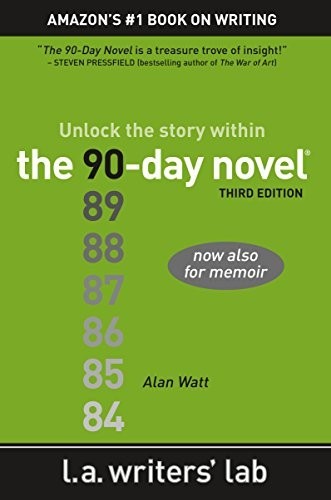 Let’s face it: writing a novel is hard work. And, one of the things that often makes it harder is books on how to write novels. Yes, you read that correctly. I honestly believe the sometimes reading a book about how to write a novel actually gets in the way.
Let’s face it: writing a novel is hard work. And, one of the things that often makes it harder is books on how to write novels. Yes, you read that correctly. I honestly believe the sometimes reading a book about how to write a novel actually gets in the way.
Perhaps you’ve read this elsewhere—and because I absolutely believe this to be true, I think it bears repeating—there are two kinds of novelists:
- Writers who write by the seat of their pants (sometimes called “pantsers”) and write each day without planning their novels.
- Writers who plan each part of their novels before they write it, complete with character sketches and an outline.
The trick is knowing which kind of writer you are before you purchase a book that will help you write a novel.
Why It’s Important to Know What Kind of Writer You Are
 I can tell you from personal experience: it’s important to know if you are a “pantser” or a planner because if you choose the wrong kind of book for you, then you won’t be able to get your novel written. For years, I was using the wrong method and failed to make any real progress.
I can tell you from personal experience: it’s important to know if you are a “pantser” or a planner because if you choose the wrong kind of book for you, then you won’t be able to get your novel written. For years, I was using the wrong method and failed to make any real progress.
As you may have guessed, I fall into the former category of writers: I write by the seat of my pants. Every day, I open my notebook to a fresh page and fall in love, each and every day. I allow my characters to surprise me, and every day, I discover new things about them.
I write not just to evolve or to tell stories but to fall in love, no matter what else is going on in my life. I love the thrill and the rush of allowing my wild mind free rein. I love the images that surprise me and that don’t even necessarily make sense. I love it when my characters say something surprising and I think, wow, I had NO IDEA that you felt that way.
And now that you know this about me, imagine how difficult writing had been when I was trying to get the structure of my novel down before the discovery process. I just never got anywhere with my rough draft.
What Wasn’t Working
I had purchased countless of books geared towards left-brained writers who wanted to plan their every move before they wrote a single word. The problem is that these books sucked every creative impulse out of me, and my writing lost its zest and its gusto, the two ingredients Ray Brandbury says every writer must have in his wonderful book Zen in the Art of Writing: Essays on Creativity. Every day, writing was a chore, and I found that I just could not move forward with my novel. So, I admitted defeat and packed up my writing notebooks and locked them in an old chest.
But I couldn’t admit defeat for long. Why? Because I am a writer and a novelist, and I decided that I had to give myself another chance at completing my novel.
The Book that Changed Everything
 A few days after I made that decision to keep going with the rough draft of my novel in progress despite the fact that everything I had tried wasn’t working for me, I discovered Alan Watt’s book The 90-Day Novel. I was browsing in a used bookstore and saw it there on the shelf in the back of the store where books are kept on writing. It took awhile to find because I first had to sift through the books on how to write a decent essay and a brilliant romance novel and how to write for children. Title after title didn’t quite fit, but then I found it. Thinking it was like all the other structure-oriented books I’d read about novels, I almost didn’t look at it, but curiosity got the better of me and I started leafing through the book.
A few days after I made that decision to keep going with the rough draft of my novel in progress despite the fact that everything I had tried wasn’t working for me, I discovered Alan Watt’s book The 90-Day Novel. I was browsing in a used bookstore and saw it there on the shelf in the back of the store where books are kept on writing. It took awhile to find because I first had to sift through the books on how to write a decent essay and a brilliant romance novel and how to write for children. Title after title didn’t quite fit, but then I found it. Thinking it was like all the other structure-oriented books I’d read about novels, I almost didn’t look at it, but curiosity got the better of me and I started leafing through the book.
What I found absolutely astounded me: it was the admission of a man who’d written a brilliant, award-winning first novel Diamond Dogs that writing is largely a process of discovery. Watt said that we can’t possibly “know” what needs to go into our novels until we inquire into our characters. He believes this is largely a right-brained process, and while he incorporates the idea of structure into the writing process, in his book, he makes it largely a question and answer process. Each day, as a writer you ask increasingly complex questions about your characters and allow them to reveal themselves to you. When I read about this method for writing a novel, I absolutely knew that it would work for me.
I was so excited to have discovered The 90-Day Novel but disappointed to see that the copy in the bookstore was in rough shape. Between the broken spine and the excessively annotated pages, I decided I needed a clean reading copy. I raced home, fired up my computer and ordered my copy from Amazon for next-day delivery. Once I discovered the book that I knew would allow me to finish my rough draft, I couldn’t wait another day to get started.
My Happy Ending as a Novelist
 After floundering around for years, unable to write a decent novel despite an absolute burning desire to do so, I am now happily writing every day, thanks to Watt’s book. The 90-Day Novel gave me permission to really allow myself to let go on the page, to not plan anything and just write. I needed to this book in order to write my novel, which is a story about two cousins. It is about a family in crisis, about to lose their house due to excessive medical bills. It is about loyalty and not giving up on a dream. It’s not exactly a legal thriller, but my young heroine, in an attempt to keep her parents’ house, gets into some trouble when she starts an illegal business to make money and her cousin threatens to turn her into the authorities.
After floundering around for years, unable to write a decent novel despite an absolute burning desire to do so, I am now happily writing every day, thanks to Watt’s book. The 90-Day Novel gave me permission to really allow myself to let go on the page, to not plan anything and just write. I needed to this book in order to write my novel, which is a story about two cousins. It is about a family in crisis, about to lose their house due to excessive medical bills. It is about loyalty and not giving up on a dream. It’s not exactly a legal thriller, but my young heroine, in an attempt to keep her parents’ house, gets into some trouble when she starts an illegal business to make money and her cousin threatens to turn her into the authorities.
Writing is, once again, fun. It is a process of discovery, and my characters surprise me every day. They tell me secrets, and I know things about them that I never would have thought up on my own. Each day, they reveal more of their story, and I write it down. Thanks to Watt’s book, I am now deeper into the story than I ever had been before and speeding my way to the end of my first draft.
Traditional Methods Didn’t Help
Despite my best efforts, my previous writing attempts required me to plan the novel and simultaneously hold structure loosely enough in my mind to allow my characters to reveal themselves in their own way. This is a task that I found impossible, so I was never able to finish my novels before. This is despite getting accepted to and enrolling in an MFA program. I had thought for sure that I would be able to finish writing my novel while in my MFA program, but it never happened. I ended up concentrating on poetry, but the desire to write novels was present throughout my time in the program.
I learned a great deal in my MFA program, and I developed the discipline to write every day. Despite working at writing, though, I was not able to finish the rough draft of a novel until I discovered Watt’s book.
If you have a desire to complete your novel or memoir, I hope The 90-Day Novel will be as helpful to you as it has been for me. I owe so much to Watt for writing this book that gave me permission to write the way I was born to write. May it give you permission to pursue your dream of becoming a published novelist, too.

A book to help you write a book,what a great approach to writing a novel. I suppose that realistically i would be in the “pansters” class if i were to write a novel as i wouldn’t really have a clue.I will have to look into the 90 day novel book and maybe contemplate a more professional approach to writing a novel.
Thanks for your comments, Andrew! If you have any questions as you’re getting started, please feel free to get in touch.